牛津译林版必修一Unit2《Growingpains》word教案(6)
新牛津译林版高中英语必修一unit 2《growing pains》language reading优秀教案(重点资料).doc
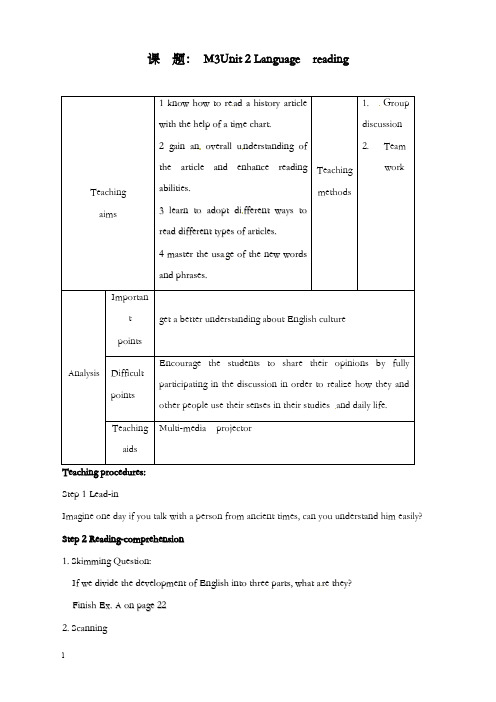
Analysis
Important
points
get a better understanding about English culture
Difficult
points
Encourage the students to share their opinions by fully participating in the discussion in order to realize how they and other people use their senses in their studies and daily life.
During the Renaissance in the 16th century
Modern English began
Step 5 Consolidation
Activities:
Organize students into groups of four. One is a linguistic expert and the other three are journalists. An expert English linguist will make a brie f introduction about the development of the English language.
4) What was the German plural form replaced by?
5) Which King of England made Englis h used as the official language?
6) When did Modern English appear?
牛津译林版高中英语必修一Unit 2《Growing pains》(Project)教案

【教学难点】Howto write a report on a certain kind of growing pains.
【教具】Multi-media projector
【教学过程】
Language points
1.at the moment: at this / that moment
eacheverytimedvdhesendsmebednexttimeyouseemepleasereturnmethough作连词引导一个方式从句或标语从句用在looksmelltastesound等词后表真实情况用陈述语气thoughsomeonethough用于虚拟语气hespeaksthoughhekneweverything
She insists on writing at once
being sent to the front
Insist that宾语从句坚持要求( should) do
坚持认为、说从句前后一致
She ins isted that she (should) be sent to the front.
it is necessary to help him.
课题:M1U2 Project
【教学目标】
1. Tohave a better understanding of growing pains.
2. To cooperat e with others to write a report on a certain kind of growing pains they are interested in.
4.forbid vt ( forbade, forbidden) = not allow / permit
牛津译林版必修一Unit2 Growing pains Project教案
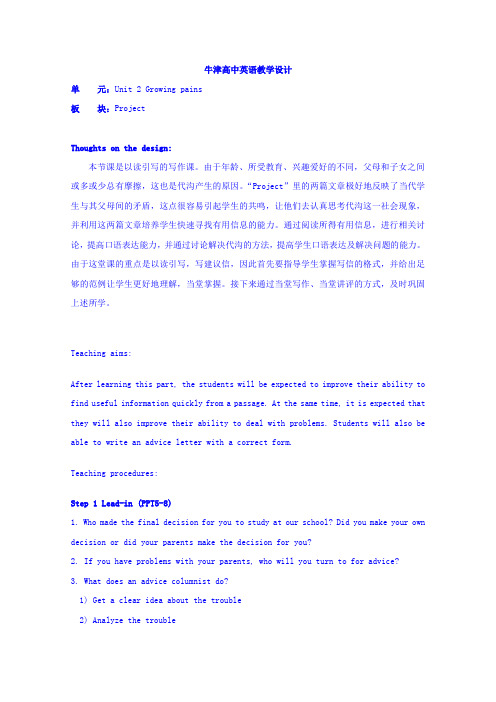
牛津高中英语教学设计单元:Unit 2 Growing pains板块:ProjectThoughts on the design:本节课是以读引写的写作课。
由于年龄、所受教育、兴趣爱好的不同,父母和子女之间或多或少总有摩擦,这也是代沟产生的原因。
“Project”里的两篇文章极好地反映了当代学生与其父母间的矛盾,这点很容易引起学生的共鸣,让他们去认真思考代沟这一社会现象,并利用这两篇文章培养学生快速寻找有用信息的能力。
通过阅读所得有用信息,进行相关讨论,提高口语表达能力,并通过讨论解决代沟的方法,提高学生口语表达及解决问题的能力。
由于这堂课的重点是以读引写,写建议信,因此首先要指导学生掌握写信的格式,并给出足够的范例让学生更好地理解,当堂掌握。
接下来通过当堂写作、当堂讲评的方式,及时巩固上述所学。
Teaching aims:After learning this part, the students will be expected to improve their ability to find useful information quickly from a passage. At the same time, it is expected that they will also improve their ability to deal with problems. Students will also be able to write an advice letter with a correct form.Teaching procedures:Step 1 Lead-in (PPT5-8)1. Who made the final decision for you to study at our school? Did you make your own decision or did your parents make the decision for you?2. If you have problems with your parents, who will you turn to for advice?3. What does an advice columnist do?1) Get a clear idea about the trouble2) Analyze the trouble3) Give proper suggestions4) Keep in touch with the sender高中择校是一个敏感问题,直接关系到以后的升学。
牛津译林版高中英语必修一Unit 2《Growing pains》(Word Power)教案
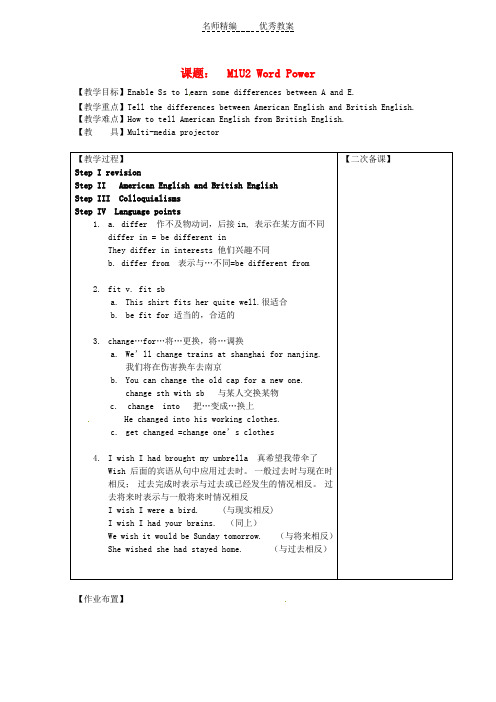
课题: M1U2 Word Power【教学目标】Enable Ss to l earn some differences between A and E.【教学重点】Tell the differences between American English and British English. 【教学难点】How to tell American English from British English.【教具】Multi-media projectorHe changed into his working clothes.【作业布置】【教学后记】课题: M1U2 Grammar and usage主备:第 6-7 课时总 10 课时【教学目标】1. Enable the students to grasp the basic rules for attributive clauses—“prep. + which/whom” used to begin attributive clauses.2. To have a general i dea of the usage of relative adverbs.3. To learn the studying strategy for language learning.【教学重点】Let students know the rules of attributive clauses.【教学难点】Let students understand the usage of relative adverbs.Dad is a person语或宾语,代表整个句子e.g. This is the house in wh ich I lived two years ago.turned down my offer. =This is the house in which he lived two years ago.time.the only girl I went steady with during the four e.g. This i s the place (where) I saw him last time.B. tha t【作业布置】【教学后记】。
牛津译林版高中英语必修一Unit 2《Growing pains》(Growing pains)教案

【教学目标】
1.To introduce and develop the theme of growing pains.
2.To develop speaking ability by talking about families and problems that happen between teenagers and parents.
How does his mother feel about the sห้องสมุดไป่ตู้ore?
What feelings may the boy have?
Step 4 Picture description
Imagine the situations and try to describe each picture as fully as po ssible with their own words.
3.To know more about classmates and their families.
【教学重点】Get students to understand what growing pains means.
【教学难点】Help students to form a positive attitude towards relationships between their parents and them.
Picture 1
What does the boy do?
What is the mother doing? How is she probably feeling?
What feelings may the boy have?
牛津译林版高中英语必修一Unit 2《Growing pains》(Test Papers)教案
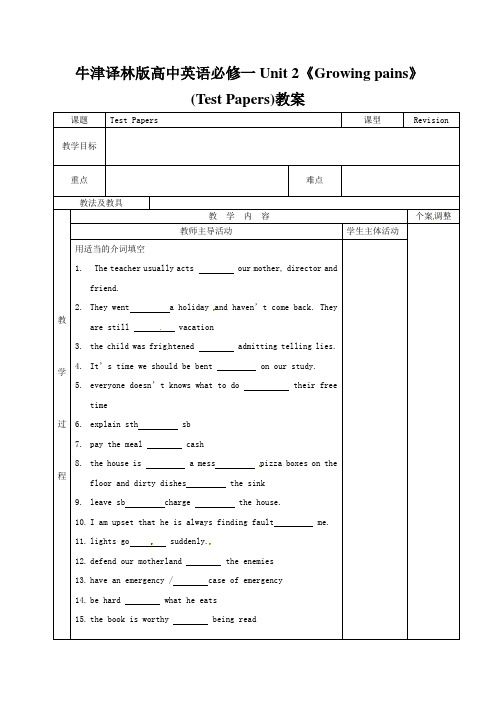
牛津译林版高中英语必修一Unit 2《Growing pains》(Test Papers)教案课题Test Papers 课型Revision 教学目标重点难点教法及教具教学过程教学内容个案调整教师主导活动学生主体活动用适当的介词填空1. The teacher usually acts our mother, director andfriend.2.They went a holiday and haven’t come back. Theyare still vacation3.the child was frig htened admitting telling lies.4.It’s time we should be bent on our study.5.everyone doesn’t knows what to do their freetime6.explain sth sb7.pay the meal cash8.the house is a mess pizza boxes on thefloor and dirty dishes the sink9.leave sb charge the house.10.I am upset that he is always finding fault me.11.lights go suddenly.12.defend our motherland the enemies13.have an emergency / case of emergency14.be hard what he eats15.the book is worthy being read16.be rude / it’s rude him to shouthis parents.教学过程教学内容个案调整教师主导活动学生主体活动17.the play is the f orm of a dialogue.18.there is a lot of garbage all the place.19.They went a holiday and haven’t come back. They arestill vacation20.the child was frightened admi tting telling lies.21.It’s time we should be bent on our study.22.everyone doesn’t knows what to do their freetime23.explain sth sb24.pay the meal cash25.the house is a mess pizza boxes on thefloor and dirty dishes the sink26.leave sb charge the house.27.I am upset that he is always finding fault me.28.lights go suddenly.29.defend our motherland the enemies30.have an emergency / case of emergency板书设计(用案人完成)当堂作业课外作业教学札记。
牛津译林版高中英语必修一Unit2《Growingpains》教案

牛津译林版高中英语必修一Unit2《Growingpains》教案Teaching Aims 1 Learn about what noun clausesintroduced by question words are,the functions of each clause and theword order of the clause.2 know th e empty subject it acts ast he grammatical subject of thesentence and in what situations it isoften used.Teachingmethods1.Groupdiscussion2.Team workAnalysis ImportantpointsNoun clauses.DifficultpointsNoun clauses introduced by question words. TeachingaidsMulti-media projectorI. Noun clauses introduced by question wordsStep 1 引导名词性从句的连词分为三种:连词that连接代词 who, whom, whose, which, what连接副词 when, where, how, why 等。
Step 2 从整句结构和从句结构的分析入手1 Who was responsible for the accident is not yet clear? 连接代词2 You can begin to see why English has such strange rules. 连接副词3 My idea is that we should spend our holidays b y the seaside.连词 thatII. Empty subject itStep 1 Try to find the real subjectIt is important for us to learn English well today.It is no use wasting your time reading such books all day.Conclusion: the subject is a nou n clause, a to-infinitive or a v-ing form. (PartA on Page 31Step 2 Translation:1 要把握一门外语是困难.It is hard to master a foreign language.To master a foreign language is hard.Read Part 1 on Page 30.Step 3 Rewrite the sentencesIt seems that he speak two languages.= He seems to speak two languages.My new neighbor happens to come from my hometown.=It happens that my new neighbor come from my hometow n.Draw students’ attention to P art 2 on page 30.Step 4 how to emphasize the eleme nt in a sentence by using Empty Subject it Jane gave Mary a handbag at Christmas.It was Jane that / who gave Mary a handbag at Christmas.It was Mary that Jane gave a handbag (to) at Christmas.It was a handbag that John gav e Mary at Christmas.It was at Christmas that John gave Mary a handbag.Conclusion: It + be的一定形式+被强调部分+that /who分句形式主语和形式宾语的应用:当主语从句比较长,主句比较短时,通常用形式主语it,而把从句放在后面,如:(1)It is said that they have succeeded in working out the problem.(2)It was important that we should make the plan carefully.(3)It remains a secret how the animals came to live in the sea.当宾语从句后面有补语的时候,我们也需要用形式宾语it, 而将宾语从句放在补语之后,如:(1)I found it very difficult that one learns several languages at the same time.(2)He thinks it necessary that we should be given more time practising oral English.(3)He made it clear that he would leave the office soon.Step 5 ConsolidationGrammar1. 1. promise v. 许诺,承诺。
译林牛津高中英语M1 Unit2 Growing pains 教学设计 高中英语
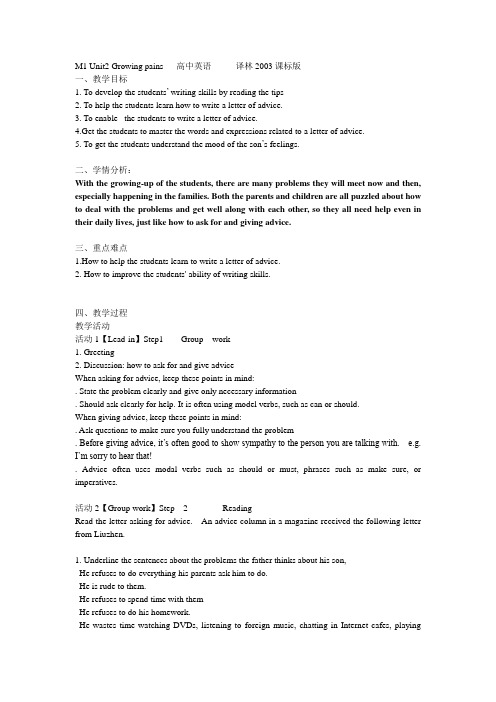
M1 Unit2 Growing pains 高中英语译林2003课标版一、教学目标1. To develop the students’ writing skills by reading the tips2. To help the students learn how to write a letter of advice.3. To enable the students to write a letter of advice.4.Get the students to master the words and expressions related to a letter of advice.5. To get the students understand the mood of the son’s feelings.二、学情分析:With the growing-up of the students, there are many problems they will meet now and then, especially happening in the families. Both the parents and children are all puzzled about how to deal with the problems and get well along with each other, so they all need help even in their daily lives, just like how to ask for and giving advice.三、重点难点1.How to help the students learn to write a letter of advice.2. How to improve the students' ability of writing skills.四、教学过程教学活动活动1【Lead-in】Step1Group work1. Greeting2. Discussion: how to ask for and give adviceWhen asking for advice, keep these points in mind:. State the problem clearly and give only necessary information. Should ask clearly for help. It is often using model verbs, such as can or should.When giving advice, keep these points in mind:. Ask questions to make sure you fully understand the problem. Before giving advice, it’s often good to show sympathy to the person you are talking with. e.g. I’m sorry to hear that!. Advice often uses modal verbs such as should or must, phrases such as make sure, or imperatives.活动2【Group work】Step2ReadingRead the letter asking for advice. An advice column in a magazine received the following letter from Liuzhen.1. Underline the sentences about the problems the father thinks about his son,He refuses to do everything his parents ask him to do.He is rude to them.He refuses to spend time with themHe refuses to do his homework.He wastes time watching DVDs, listening to foreign music, chatting in Internet cafes, playinggames and surfing the internet.Then anwser the following questions:1)What is Liu Zhen’s main point in paragraph 1?2) How do the boy’s parents and grandparents treat him?3) What is Liu Zhen’s main point in paragraph 2?4) Why does Liu Zhen tolerate his son so far?5) What is Liu Zhen afraid that his son will do?6) What is the main piece of advice that Liu Zhen is looking for?活动3【Group work】Step 3: Writing a letter of advice for a reply.1) A discussion about how to write a reply letter of advice.. Find the main parts of the letter asking for advice.. Answer each of these points directly.. Don’t give advice for points not discussed in the letter.. Offer comfort and support. Don’t find fault with the person you are writing to.. Use modal verbs such as should or must, phrases such as make sure, or imperatives to give your advice.2) Make a choice: Now decided which letter is better and why according to the tips above.Read the letters of advice were written in reply to Liu Zhen’s letter in step 2.Compare the two letters, and then discuss with your classmates which letter is better and why.3) Writing a letter of adviceUse the skills you have learnt in steps 1and 2, and the second example from skills building 3 to help you.. Read the letter from Liu Zhen’s son who is asking for advice about his father; try to find the main point of each paragraph, and think of what is the son’s feeling—he loves his father but he upsets about how to get well along with him.. Using the useful sentences. Opening sentences:I am very glad to hear from you.Thank you for your letter.You have asked me for my advice with regard to … and I will try to make some suggestions.I am writing in reply to …. Closing sentences:I hope you will find my suggestions/recommendations/advice helpful/practical/ useful.At last, I hope I will be your best friend’s forever! Good luck to you!Let’s keep in touch. I do hope to hear good news from you.Step 4. Homework:1. Write down the letter of advice2. Preview the part Project.。
牛津译林版必修一Unit2 Growing pains Word power教案
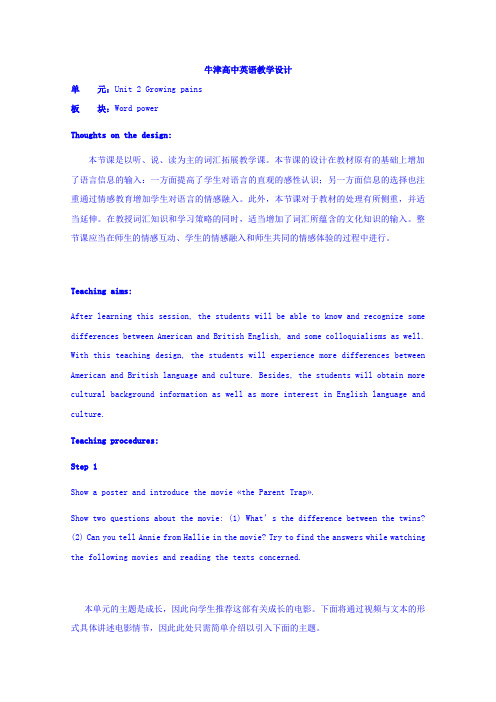
牛津高中英语教学设计单元:Unit 2 Growing pains板块:Word powerThoughts on the design:本节课是以听、说、读为主的词汇拓展教学课。
本节课的设计在教材原有的基础上增加了语言信息的输入:一方面提高了学生对语言的直观的感性认识;另一方面信息的选择也注重通过情感教育增加学生对语言的情感融入。
此外,本节课对于教材的处理有所侧重,并适当延伸。
在教授词汇知识和学习策略的同时,适当增加了词汇所蕴含的文化知识的输入。
整节课应当在师生的情感互动、学生的情感融入和师生共同的情感体验的过程中进行。
Teaching aims:After learning this session, the students will be able to know and recognize some differences between American and British English, and some colloquialisms as well. With this teaching design, the students will experience more differences between American and British language and culture. Besides, the students will obtain more cultural background information as well as more interest in English language and culture.Teaching procedures:Step 1Show a poster and introduce the movie «the Parent Trap».Show two questions about the movie: (1) What’s the difference between the twins?(2) Can you tell Annie from Hallie in the movie? Try to find the answers while watching the following movies and reading the texts concerned.本单元的主题是成长,因此向学生推荐这部有关成长的电影。
2021牛津译林版必修一unit2《growingpains》word学案
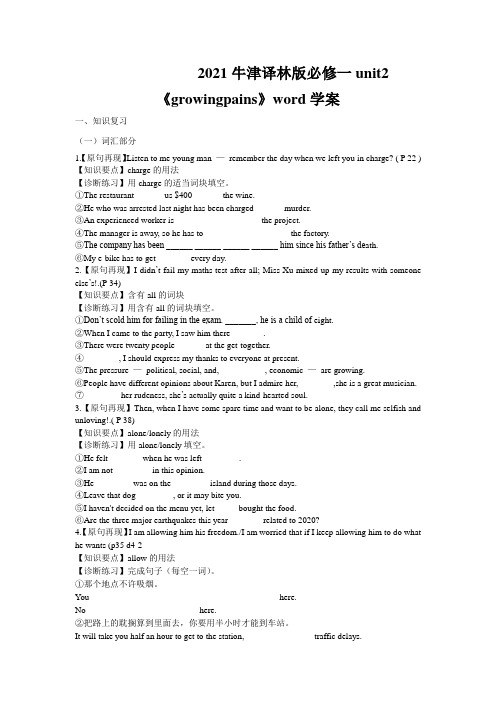
2021牛津译林版必修一unit2《growingpains》word学案一、知识复习(一)词汇部分1.【原句再现】Listen to me young man —remember the day when we left you in charge? ( P 22 ) 【知识要点】charge的用法【诊断练习】用charge的适当词块填空。
①The restaurant ______ us $400 ______ the wine.②He who was arrested last night has been charged ______ murder.③An experienced worker is ______ ______ ______ the project.④The manager is away, so he has to ______ ______ ______ the factory.⑤The company has been ______ ______ ______ ______ him since his father’s de ath.⑥My e-bike has to get _______ every day.2.【原句再现】I didn’t fail my maths test after all; Miss Xu mixed up my results with someone else’s!.(P 34)【知识要点】含有all的词块【诊断练习】用含有all的词块填空。
①Don’t scold him for failing in the exam. _______, he is a child of eight.②When I came to the party, I saw him there _______.③There were twenty people ______ at the get-together.④________, I should express my thanks to everyone at present.⑤The pressure —political, social, and, __________, economic —are growing.⑥People have different opinions about Karen, but I admire her, _______ ,she is a great musician.⑦_______ her rudeness, she’s actually quite a kind-hearted soul.3.【原句再现】Then, when I have some spare time and want to be alone, they call me selfish and unloving!.( P 38)【知识要点】alone/lonely的用法【诊断练习】用alone/lonely填空。
牛津译林版高中英语必修一Unit2《Growingpains》(Homealone)教案
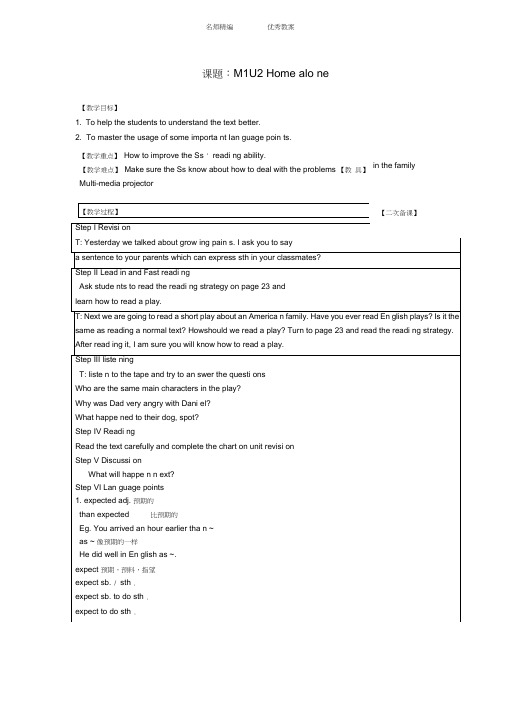
课题:M1U2 Home alo ne【教学目标】1. To help the students to understand the text better.2. To master the usage of some importa nt Ian guage poin ts.【教学重点】 How to improve the Ss ' readi ng ability.【教学难点】 Make sure the Ss know about how to deal with the problems 【教 具】Multi-media projectorin the family【二次备课】expect that …①我们谁也没预料到这种情况。
No ne of us expected it .我在等他的来信。
I ' m expecting his letter .③不要对他期望太咼。
Don' t expect too much of him.你预计什么时候回来?When do you expect to be back? 你别指望他会支持你。
You can' t expect him to support you .我想他会很快回来的。
I expect that he ' II come back soon 她会不会来呢?”“我想会/不会。
”“Will she come? ”“ I expect so/ not. ”2. surprise1). vt. 使惊奇;使惊讶What you said surprised me.I am surprised at what you said just now.What surprised me most was that the little boy could speak En glish so well. 2). adj. surprising 令人吃惊的surprised 吃惊的;受惊的a. It is that they lost.b. I am that they lost.c. She wore a look whe n she came into the room.n.令人惊奇的事(可数)吃惊;惊奇It was a pleasant surprise to see them again.To my surprise, he came back so soon.3. followa. 跟随you go first, an d I ' ll follow later.听从,采纳1 ' II follow your advice follow one's exampleb. followi ng vs. followedfollowi ng 接下来的,随后的in the followi ng years/ days分词作伴随作为现在分词跟过去分词,构成的短语可以充当状语,但意思相反A teacher came into the classroom, followed by a group of Ssfollow ing a group of Ss(一群学生紧跟其后,跟在一群学生后面)She sat at the table, readi ng a magaz ine.He stood there, not knowing what to do.4 be gone用完了,不在了I need to buy sth to drink, because all mywater is gone.5. in charge (of sth/sb) 负责,掌管某事主管,掌管;在……管辖之下,由……照顾* sb. be in charge of sth.某人负责,掌管,照顾* sth. be in the charge of sb. /in one s charge在……掌管之下,由……经管1. Mary is in charge of the hospital.The hospital is in the charge of Mary.2. The project is in the charge of Dr Gre . en.Dr Gree n is in charge of the project.* free of charge=for free6. stopa) ~ doing~ to dob) 停止某人做某事~ sb ( from ) doing sth=preve nt sb (from) doing sth=keep sb from doing sth7. have sb/sth doing have sb / sth doa. have …do ing 让…一直做某事b. have …do 让…做某事c. have sth done 使某事被做遭遇,经历8. deserve~ to do 应该做某事,值得做某事They ~ to know the truthThey didn ' t ~ to win.He killed a young lady and he deserved to be put intoprison.Tom did wrong and deserved puni shme nt/to be puni shed.9. in stead of vs. in steadIn stead of 后接的动作或状态是不做的In stead 连在一起的句子中的动作或状态是要执行的或存在的The water here is not good, so I am drinking beer in stead. we ll have fish in stead of meat for lun ch.10. With + 名词(代词) +介词短语/形容词/副词/分词/不定式He stood there with his hands in his pockets.She said goodbye with tears in his eyes.The teacher came in with a book in his han ds.Do you know the man with a child in her arms/With nothing to do , I went shopp ing.The boy lay on the grass, with his eyes look ing at thesky.She stepped out of the prison with her hands tied.11. leavea. 把…交给,委托…leave + n+ to/with+n 把… 托付给/委托给~ sb to do sth 委托某人做某事b. 使…处于某种状态! +n + adj./ 现在分词、过去分词、名词、介词短语Mrs Anny left her daughter with /to us and went shopping.The gover nment will leave buildi ng the museum to thatcompa ny.What he said left me thinking deeply.12 You weren' t supposed to come home until tomorrow!1 be supposed to do sth.发现者号航天飞机应该在8月8日返回.Shuttle Discovery was supposed to retur n on Aug 8 .校会应该在周一早晨举行.The school assembly was supposed to be held on Mon day morni ng.2 sup .pose …怎么样?Suppose you have ano ther try.Suppose we have an En glish party.3 suppos ing 假女口Suppos ing it rains, what will you do?Suppos ing he is late, shall we go first?=If ......13 I feel like we have to - punish h im or he …feel like如果想要,我们可以外出散步If you feel like, we can go out for a walk.我现在不想要大吃一顿.I don ' t feel like (having) a big meal now这种材料摸起来象丝绸.【教学后记】。
英语必修ⅰ牛津译林版unit2growingpains教案6

Unit 2 Growing painsPart One Teaching DesignAims and requirements♦ Read a play about an American family and two letters♦ Listen to a radio talk show♦ Talk about problems common to teenagers♦ Present a dialogue♦Write an advice letterprocedures●Welcome to the UnitStep 1: Brainstorming1. Do you love your parents? Do you think you show respect to your parents?2. Do you sometimes quarrel with your parents? How do arguments usually happen? Will you give examples of kinds of problems you sometimes have with your parents.Some parents may interfere in their children's lives and try to influence their decisions about their future career or study plans.Parents may want to make decisions for their children and also force them into doing things they don't want to, such as household chores or extra study.Some parents don't always trust that their child is telling the truth. They may ask lots of questions about a child's social activities or the reason why they are late coming home, etc.Some of the problems we have been discussing are quite common in families nowadays. What should you do to deal with these problems?Do you nowadays always listen to your parents' instructions? Do you always explain yourselves to your parents and resolve problems peacefully? Or do you disobey your parents and quarrel with them about your decisions?In every family there are certain issues that cause problems and arguments. What are the most common causes of family arguments? Are these daily conflicts over doing homework, doing household chores and going to bed and getting up on time? Or are they over bigger issues such as study, careers, university and making friends?Step 2: Discussing and practicing1. Look at each picture carefully. There are four pictures here. First of all, I'd like you to imagine the situation and try to describe it with your own words.(The teacher can show an example to students by describing the first picture.)Last Sunday, after leaving school, Li Ping went home feeling extremely tired. He wanted to have a good rest and relax. When his parents said hello to him, he was so impatient that he didn't say anything and went straight to his own bedroom. Though his parents were very confused, they didn't ask him why and continued with the cooking. After a while, loud music came from Li Ping's bedroom. His mother was very angry and she rushed into his room.● ReadingStep 1: Lead-inHave you ever seen the famous TV show ‘Growing Pains’? What do you think of the play? Have you ever had this kind of experience when your parents had to go away and leave you alone or with a pet? If not, can you imagine what might happen if you were left alone? Could you handle all the responsibility and keep everything clean and safe?Step 2: Fast reading for general ideas1. From Unit 1, we have learnt two of the basic reading skills, skimming and scanning.When reading different styles and formats of articles, readers usually use different waysof reading in order to know about the main ideas of the article within the shortest time.Bacon once said, some books are to be chewed; some are to be swallowed; some are to bedigested. So can you tell me how to read an English play? You may discuss this questionwithyour partners first and then I’d like some of you to tell the class your opinion.2. A play usually consists of several acts. Each act can have several scenes. So can youtell me some characteristics of a play? Is the format of a play the same as that of a newsarticle? Are the words or speeches in a play very formal? Are there any instructions ortips included in a play? What do the instructions or tips do? Do you think you have toread a play silently or out loud?Please discuss all these questions in groups of four and share your opinions with yourgroup members.3. Go through the Reading strategy of this unit, that is, how to read a play. A play hasa unique format and style. Most plays are in the form of a dialogue. A large amount ofcasual speech is used, sometimes with incomplete sentences. In order to better understanda play, you should read it out loud instead of silently and that you have to pay attentionto the instructions or tips included in a play.4. Read the play first and then finish Part A individually. Then conduct a feedbackactivity.Answers① Who are the main characters in the play? (Eric, Daniel, Mom and Dad.)② Why was Dad very angry with Daniel? (The room was a mess. / There was trash all overthe place.)③ What happened to their dog, Spot? (Spot was ill.)Step 3: Detailed reading for important information1. Read the play a second time.2. Let’s do with Parts C1 and C2 individually, and after that conduct a feedback activity.AnswersC1 1. Dad 2. Daniel 3. Dad 4. Daniel 5. Eric 6. Dad 7. MomC2 1. F 2. F 3. T 4. F 5. T3.Let’s divide into several groups and each group first read the play out loud and thenact it out. Pay attention to imitating the tones and intonations of each character whilereading. We can hold a competition to see which group is the best.4. Let’s finish Parts D1, D2 and E individually first and then conduct a feedback activity.AnswersD1 1. d 2. e 3. a 4. f 5. c 6. bD2 (1) adult (2) decision (3) a teenager (4) supposed (5) unpunishedE (1) behavior (2) door (3) adult (4) Dad (5) supposed(6) decisions (7) Spot (8) vacation (9) money (10) waited5. Let’s do with Parts A1 and A2 on page 86 in Workbook.AnswersPart A1 (page 86)1. surprise surprised surprised2. waste waste3. decision decide4. punish unpunished5. cross crossed6. cans Can7. sound soundsPart A2 (page 86)1. like2. in on3. with of4. at5. by6. from7. through Step 4: Post-reading1. Do you think Eric and Daniel will explain to their parents what has happened? Or willthe parents go and ask the two children what has happened?Suppose you were one of the two children. What would you do? Would you stay silent or wouldyou offer an explanation to your parents? Which is a better solution in your opinion?2. Talk about your own experiences since these kinds of family problems exist in almost every family.▲How do your parents usually deal with your wrong-doings? Are they too harsh?▲Have they ever punished or scolded you for your being late when it wasn't your fault? ▲How do you think good parents should treat their children? Should parents respect their children and value their opinions?▲What qualities or personalities do you think the ideal parents should possess?3. Focus on Part F, which is designed for you to practise your spoken English with topics closely related to your familiar family problems.▲Do you think you have a good relationship with your parents? Why do you sometimes quarrel with them?▲Do you agree there is a generation gap between you and your parents? How can you narrow the gap?▲Communication is very important in helping you and your parents become closer. Yet why do teenagers refuse to communicate with their parents sometimes?Step 5: Divide students into groups of five. One is the narrator and the others are the main characters. Role-play Act One and Act Two.1. Suppose you were one of the children what would you do?2. How do you think good parents should treat their children?3. Do you think there is a generation gap between you and your family? How can you deal with it?Step 6: Homework1. Write an end to the play.2. Role-play the dialogue in groups of five。
牛津译林版高中英语必修一Unit 2《Growing pains》(word powder)教案
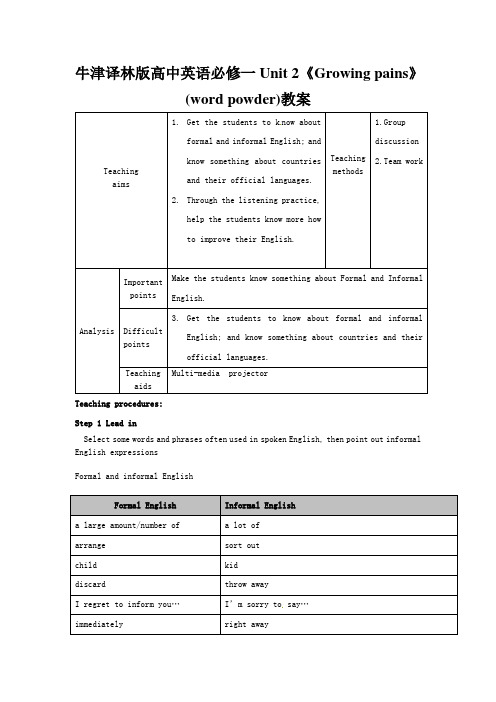
牛津译林版高中英语必修一Unit 2《Growing pains》(word powder)教案Teaching aims 1.Get the students to k now aboutformal and informal English; andknow something about countriesand their official languages.2.Through the listening practice,help the students know more howto improve their English.Teachingmethods1.Groupdiscussion2.Team workAnalysis ImportantpointsMake the students know something about Formal and InformalEnglish.Difficultpoints3.Get the students to know about formal and informalEnglish; and know something about countries and theirofficial languages.TeachingaidsMulti-media projectorTeaching procedures:Step 1 Lead inSelect some words and phrases often used in spoken English, then point out informal English expressionsFormal and informal EnglishFormal English Informal Englisha large amount/number of a lot ofarrange sort outchild kiddiscard throw awayI regret to inform you…I’m sorry to say…immediately right awayin addition plusIt is my hope…Hop e…prevent stoppurchase buyreply answ erspeak to have a word withStep2 PracticeAsk students to practice what they have learnt above.First point out the informal places while they are reading the letter.Then rewrite the letter in formal English.Answers:Dear Mr. Smith,I want to speak to you about the condition of the playground. I regret to inform you that people do not discard their rubbish properly. They leave rubbish on the ground instead of using the bins. Yesterday a 6-year-old child fell and cut his hand on a broken bottle. The boy was taken to hospital immediately. In addition, the beautiful vie w of the park is spoiled.I believe that there are a large number of actions you could take to solve this problem. For example, you should purchase additional litter bins and a rrange security to prevent people from littering.It is my hope that you will take my concerns into consid erat ion. I look forward to your reply.Yours sincerely, Jerry BrokerStep3Word power ( Group work )1. How many languages are spoken in the world today?( About 6,000)2. Do you know the ten most widely spoken languages? What are they?( They are Chinese, English, Hindi, Spanish, Russian, Arabic, Bengali, Portuguese, Malay and French..)①. Organize students into groups o f four and provide each group with a word map. Have each group write down as many names of countries and their official languages as possible.Use the following diagram as a pattern to organize the information.Country Official language(s) Country Officiallanguage(s)Australia English Mexico SpanishBengal Bengali New Zealand English, MaoriCanada English, French Portugal P ortugueseChinese Chinese Russia RussianEgypt Arabic Saudi Arabia ArabicFrance French Singapore English, Chinese, Malay, Tamil Germany German Spain SpanishIndia English, Hindi Switzerland French, German, ItalianIreland English, Irish U. k EnglishItaly Italian USA English②. Then have students finish Part A and share their answers with their group members.Step 4 Listening practiceAsk students to do the exercises in Parts A and B in listening on page 98 i n their Workbook. Let them know more about how to improve their English.Step5 Summary and homeworkWe’ve known something about formal and informal English, deal with s ome words and expressions related to languages, and go over the names of countries and their language(s).Use these skills to enlarge or reinforce your vocabulary and try your best to improve your English.Homework:1.Go over what we learned in this period.2.Preview the next lesson3.To get more information about UN, according to the website given to you . 教学反思:。
牛津译林版高中英语必修一unit 2《growing pains》task优秀教案(重点资料).doc

a.固定,确定fix a date / day
b.安排fix everything wel l
c.修理fix the broken window
注意力集中fix one’s eyes / attention on/ upon
【二次备课】
【教学过程】
Reading for gist or the main point
Tones
1.advice
follow /take /act on one’s advice
a piece of advice/ give sb advice on
v. advice + n/-ing/sb to do/ that sb (should) do
They advised we should put off the meeting.
advice sb not to do /against doing
2. be meant to do针对...、为了…
for sb/sth
In the past, education was meant for the rich children only.
All means have been tried.
3. get / have sth done
They get a photo taken together
She got her pocked picked
Wallet stolen
get sth to do / have sb do
get / have sb doing
If you had his brains, you could work out the problems.
高一英语 Unit 2《Growing pains-第一讲》教案 牛津译林版必修1
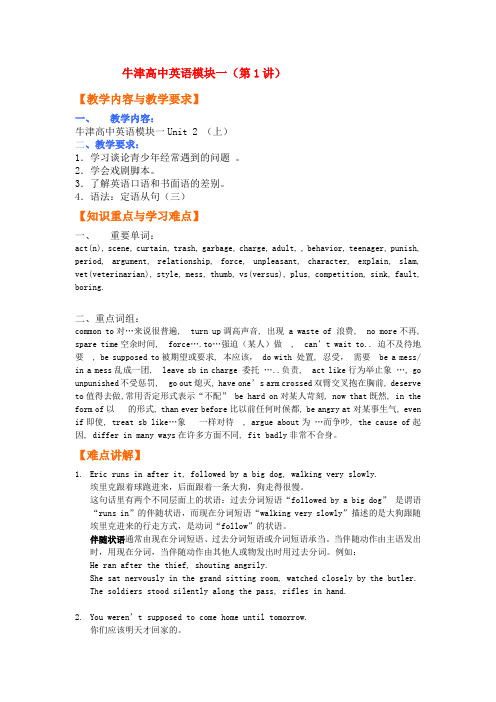
牛津高中英语模块一(第1讲)【教学内容与教学要求】一、教学内容:牛津高中英语模块一Unit 2 (上)二、教学要求:1.学习谈论青少年经常遇到的问题。
2.学会戏剧脚本。
3.了解英语口语和书面语的差别。
4.语法:定语从句(三)【知识重点与学习难点】一、重要单词:act(n), scene, curtain, trash, garbage, charge, adult, , behavior, teenager, punish, period, argument, relationship, force, unpleasant, character, explain, slam, vet(veterinarian), style, mess, thumb, vs(versus), plus, competition, sink, fault, boring.二、重点词组:common to对…来说很普遍, turn up调高声音, 出现 a waste of 浪费, no more不再, spare time空余时间, force….to…强迫(某人)做 , can’t wait to.. 迫不及待地要 , be supposed to被期望或要求, 本应该, do with 处置, 忍受,需要 be a mess/ in a mess乱成一团, leave sb in charge 委托…..负责, act like行为举止象…, go unpunished不受惩罚, go out熄灭, have one’s arm crossed双臂交叉抱在胸前, deserve to值得去做,常用否定形式表示“不配” be hard on对某人苛刻, now that既然, in the form of以的形式, than ever before比以前任何时候都, be angry at对某事生气, even if即使, treat sb like…象一样对待 , argue about为…而争吵, the cause of起因, differ in many ways在许多方面不同, fit badly非常不合身。
新牛津译林版高中英语必修一unit 2《growing pains》language welcome 优秀教案(重点资料).doc
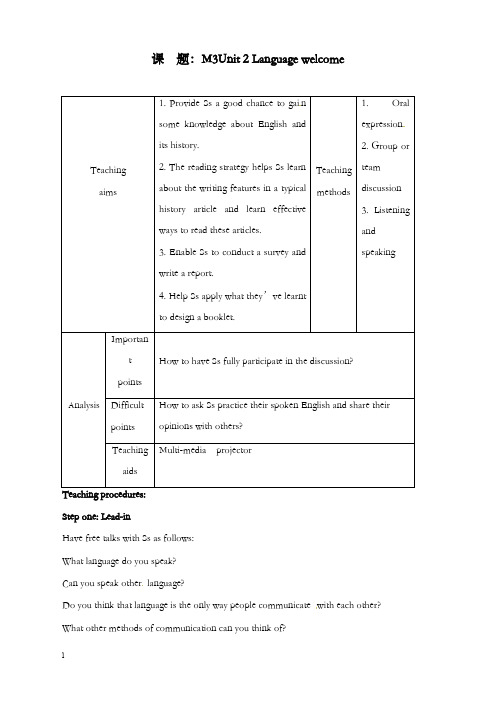
课题:M3Unit 2 Language welcome1. Provide Ss a good chance to gaiexpressionStep one: Lead-inHave free talks with Ss as follows:What language do you speak?Can you speak other language?Do you think that language is the only way people communicate with each other? What other methods of communication can you think of?Step two: Picture talkingPicture 1: languagesDo you speak any other language besides Chinese? If so, can you speak a little for us?Which other language do you like to learn best, English, Japanese or Spanish? Why?Which language do you think is the hardest? Why?Picture 2: EmotionsWhat does this emotion stand for? ( A beaming喜气洋洋的, 愉快的smile.)What is an emotion?An intense mental state that arises subjectively rather than through conscious effort and is often accompanied by physiological changes; a strong feeling:冲the emotions of joy, sorrow, reverence, hate, and love.快乐、痛苦、尊敬、痛恨和爱的冲动When do people usually use this kind of language?(When they are talking on the Internet or sending short messages.)Could you give some more example s?(For example: ☹( :-( )stands for sadness; ☺( :))stands for happiness; :-o stands for surprise.) Picture 3: Sign languageWhat does this sign mean in Britain? (good luck)Do you thin k the same sign means the same to people all over the world? If you think so, can you show some examples and explain them?( Take the American gesture OK for example. Making a circle with one’s thumb and index finger(食指, first finger/forefinger) means ‘money’in Japan but ‘zero’in France. Who needs to use sign language in their daily lives?(Deaf peo ple or those who are unable to hear)Have you ever used sign language?Is it helpful for you to communicate with others? Picture 4: BrailleA system of writing and printing for visually impaired or sightless people, in which variedarrangements of raised dots representing letters and numerals are identified by touchWhat is Braille? (A special language for blind people)Who invented Braille? ( A Frenchman called Louis Braille)Have you heard about him?What did he do for blind people? (He invented a special language for them, so it was named after him.)Picture 5: Animal languageWhy do bees fly in circles? ( To inform their partners about food and danger)Do you believe animals can ‘talk’?If possible, ask Ss to share their stories about animal language they know.Step three: DiscussionEncourage Ss to discuss the three questions listed under the five pictures on page 21Then ask them to exchange their opinions and report their responses back to the whole class. Answers for discussion:1. WE have many other ways to exchange ideas or information.For example: Chinese people relayed fire signals at night and smoke signals in the day from one Great Wall watchtower to another in ancient times.To use pigeons to send messages in the past timeNowadays, to use the language of flowers to communicate meaningRose = love; tulip= formal announcement of love郁金香Forget-me-not = k eeping me in your memory. 勿忘草2. Chinese is the most spoken language, while English is the most widely used around the world.It’s useful to learn English if you want to travel, do business, or study abroad.What’s more, in 2008, the 29th Olympic Games will be held in Beijing. We are learning English to welcome people from other parts of the world.3. To learn English well, different people have different methods or ways.Step four: Listening1. Have Ss listen to tape and finish listening exercises on page 1042. Check answers together.Homework: 1. Go over what are learned in class.2. Do some reading on page 102教学反思:。
- 1、下载文档前请自行甄别文档内容的完整性,平台不提供额外的编辑、内容补充、找答案等附加服务。
- 2、"仅部分预览"的文档,不可在线预览部分如存在完整性等问题,可反馈申请退款(可完整预览的文档不适用该条件!)。
- 3、如文档侵犯您的权益,请联系客服反馈,我们会尽快为您处理(人工客服工作时间:9:00-18:30)。
英语:Unit2《Growing pains》教案(6)(译林牛津版必修1)
一. 教学内容:
Unit 2 Growing Pains (II)
二. 教学目标:掌握Unit 2语法定语从句
三. 教学重难点:
掌握介词+关系代词引导的定语从句
掌握关系副词引导的定语从句
(一)定语从句复习
用定语从句把下列句子连接成一个句子
1. The book is mine. He is reading the book.
The book (which/that) he is reading is mine.
2. I like the girl. The girl is wearing a red skirt.
I like the girl who is wearing a red skirt.
3. She is the student. We saw her yesterday.
She is the student (who/whom/that) we saw yesterday.
4. The athlete is a famous runner. You talked to him.
The athlete who you talked to is a famous runner.
5. I have lost the book. He gave me it yesterday.
I have lost the book (which/that) he gave me yesterday.
6. I have seen the film. You talked it about last night.
I have seen the film (which/that) you talked about last night.
7. I threw the chair. Its legs are broken.
I threw the chair whose legs are broken.
(二)介词+关系代词引导的定语从句
用定语从句把下列句子连接成一个句子
1. This is the teacher. We’ve learned a lot from her.
This is the teacher (whom/who/that)we’ve learned a lot fro m.
This is the teacher from whom we’ve learned a lot.
2. The policeman is a friend of mine. Mr Henry is talking with him in the office.
The policeman (who/that/whom) Mr Henry is talking with in the office is a friend of mine.
The policeman with whom Mr Henry is talking in the office is a friend of mine.
3. The ladder began to slip. I was standing on the ladder.
The ladder (which/that) I was standing on began to slip.
The ladder on which I was standing began to slip.
4. Great changes are taking place in the city. They live in the city.
Great changes are taking place in the city (which/that) they live in.
Great changes are taking place in the city in which they live.
5. This is the library. I borrowed Harry Potter from this library.
This is the library (which/that) I borrowed Harry Potter from.
This is the library from which I borrowed Harry Potter.
总结:关系代词在从句中作宾语时,介词可提至关系代词前,构成“介词+which/whom 从句”结构。
注意:
(1)介词提前时,关系代词不可省略;
(2)介词提前时,只能用“介词+which”(指事物)以及“介词+whom”(指人)结构,此时不能用that或who。
(3)当关系代词作look after, look for, take care of等不能拆开使用的短语动词的宾语时,介词不能提前。
eg. 这是我们进行了很多讨论的问题。
This is the question about which we’ve had so much discussion.
我跟他说话的那个人是个老师。
The man to whom I spoke is a teacher.
关系代词前介词的确定
1. 动词与介词的搭配
e.g. The city ________ which I live is a beautiful one.
2. 形容词与介词的固定搭配
e.g. You’d better not bring your child to see the animals ______ which he is afraid.
3. 先行词与介词的搭配习惯
e.g. 1949 was the year_________ which the P.R.C. was founded.
KEY: in, of, in
[典型例题]
1. The sun gives us heat and light, ________ we can’t live.
答案:without which We can’t live without the heat and the light. 意为我们离开了光和热就不能生存。
指物用which
2. The student ________ we were talking just now is the best student in our class.
答案:about whom talk about sb谈论某人,指人用whom
3. I’ll never forget the day _____ she sai d goodbye to me.
答案:on which She said goodbye to me on the day. 指物用which
4. Who can give me the reason ______ he hasn’t turned up yet?
答案:for which reason固定与介词for搭配。
指物用which
5. Is that the newspaper __________you often write articles?
答案:for which write articles for the newspaper意为为报刊写文章。
指物用which 6. Can you explain to me how to use these idioms______________ I’m not sure.
答案:about which I’m not sure about the idioms. 意为不确定的习语。
指物用which (三)关系副词when, where, why的用法
1. Great changes are taking place in the city in which they live.
Great changes are taking place in the city where they live.
2. 1949 was the year in which the P.R.C. was founded.
1949 was the year when the P.R.C. was founded.
3. Who can give me the reason for which he hasn’t turned up yet?
Who can give me the reason why he hasn’t turned up yet?
关系副词都等于一个适当的介词+which,在从句中作状语
1. when在定语从句中作时间状语,相当于“介词+ 关系代词(which)”。
I’ll never forget the day when I joined the league.
= I’ll never forget the day on which I joined the league.
2. where在定语从句中作地点状语,相当于“介词+ 关系代词(which)”。
This is the house where I lived two years ago.
= This is the house in which I lived two years ago.。
